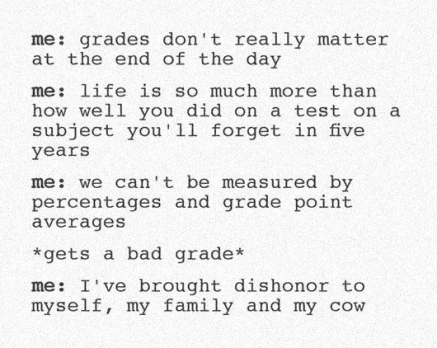Follow the Rules
“Grades tend to diminish students’ interest in whatever they’re learning” (Kohn, A. 2011)
After reading this quote I immediately remembered my previous teaching experience in Kuwait. My assessments were structured in a way that an argument is presented, and students would answer based on their background knowledge that reflect on the learning outcomes of the curriculum. I faced two problems. Firstly, was the difficulty in developing a unified marking scheme that will be fair for any answer, and because there was simply no right answer, anything they wrote was just a matter of perception. Secondly, students that did not receive satisfactory marks rushed to me, expecting a justified explanation as to why I marked them down. I felt that my students are only concerned about their grades, and forget their interest in what they were learning. If I had the option to give them all full marks I would have, but unfortunately I was trapped in a set of rules by the institution that allowed me to be selective as to where to distribute my As. In other words, the students with better answers than others received an A. At the end of each semester every instructor had to submit their class’s grade distribution that follow those rules:
- Not having more than 20% A’s
- Not having less than 20% A’s
- Not having more than 20% F’s
- Not having less than 20% F’s
If any of those rules has not been met, the instructor had to go through a justification process. They believed that it’s either the instructor is too easy with the students, or too hard, and that one of the instructors’ responsibilities is to achieve a well distributed graded class. I believe that if this system is avoided in all institutions at a global scale, there will be much less pressure on both the student and the instructor. Students will also have the freedom to learn what interests them, instructors will have the freedom to teach from their heart, and both will enjoy the teaching and learning process.
The educational systems need to lower the burden on students because the systemized grading systems are de-motivating students to learn. Vanderbilt University (2017) lists 8 strategies for motivating students, and the top 2 techniques that I would highly recommend are:
- Placing minor emphasis on testing and grading
- Giving students as much control over their own education as possible
Those recommendations will set a platform for our students to be able to express and share their ideas comfortably which will have a positive impact on their future.
Bibliography
Kohn, A. 2011. The Case Against Grades. http://www.alfiekohn.org/article/case-grades/
RSA Animate. Drive – The Surprising Truth About What Motivates Us
Vanderbilt University. 2017. https://cft.vanderbilt.edu/guides-sub-pages/motivating-students/








